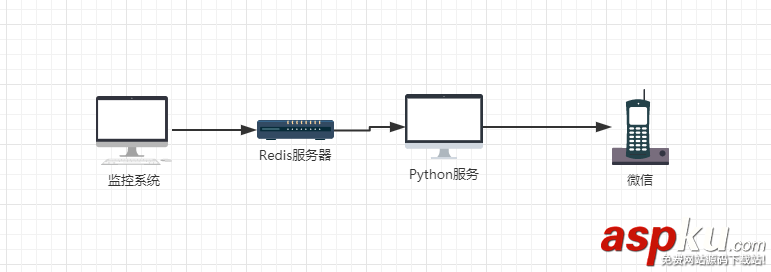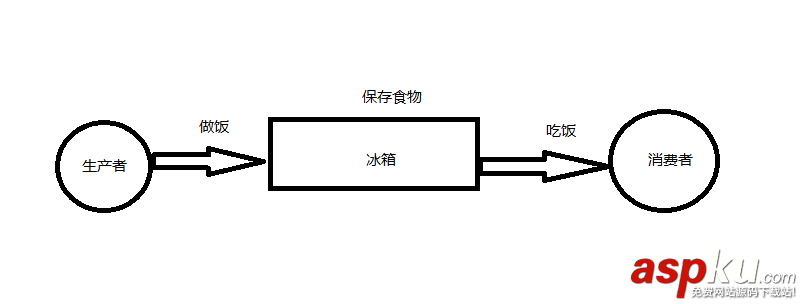概述:
本文主要分享一下博主在學習wxpy 的過程中開發的一個小程序。博主在最近有一個監控報警的需求需要完成,然后剛好在學習wxpy 這個東西,因此很巧妙的將工作和學習聯系在一起。
博文中主要使用到的技術設計到Python,Redis,以及Java。涉及到的技術看似很多,但是主要的語言是基于Python進行開發的。
架構涉及主要采用了 生產者消費者的涉及模式,使用Redis作為消息隊列進行解耦操作。
主要架構涉及如下:

接下來開始介紹一下程序的實現過程,主要講解wxpy -> python.redis -> Java.redis
1、Wxpy初體驗
項目使用的python 是3.5版本的,因此語法會和2.x版本有所區別,wxpy 支持python3.4-3.6 以及python2.7版本 ,因此在python版本上不用太過于糾結
1.1 安裝wxpy
在這里默認大家以及安裝好了pip,我們需要安裝wxpy 以及wechat_sender 兩個包,這里推薦使用國內的豆瓣源,如果大家網速過硬 請忽略。。。。
pip install wxpy -i "https://pypi.doubanio.com/simple/"pip install wechat_sender -i "https://pypi.doubanio.com/simple/"
1.2 wxpy 登陸
wxpy 使用起來非常簡單,我們只需要創建一個bot 對象,程序運行后,會彈出二維碼,掃描二維碼后顯示登陸成功。
下述代碼在登陸完成后,會向我們的文件傳輸助手發送一個“hello world!”。(每個程序都需要一個hello world)
from wxpy import *bot = Bot()bot.file_helper.send('hello world!')print("ending")關于Bot()對象的相關參數說明,我們可以在源碼中的注釋中看到:
:param cache_path:
* 設置當前會話的緩存路徑,并開啟緩存功能;為 `None` (默認) 則不開啟緩存功能。
* 開啟緩存后可在短時間內避免重復掃碼,緩存失效時會重新要求登陸。
* 設為 `True` 時,使用默認的緩存路徑 'wxpy.pkl'。
:param console_qr:
* 在終端中顯示登陸二維碼,需要安裝 pillow 模塊 (`pip3 install pillow`)。
* 可為整數(int),表示二維碼單元格的寬度,通常為 2 (當被設為 `True` 時,也將在內部當作 2)。
* 也可為負數,表示以反色顯示二維碼,適用于淺底深字的命令行界面。
* 例如: 在大部分 Linux 系統中可設為 `True` 或 2,而在 macOS Terminal 的默認白底配色中,應設為 -2。
:param qr_path: 保存二維碼的路徑
:param qr_callback: 獲得二維碼后的回調,可以用來定義二維碼的處理方式,接收參數: uuid, status, qrcode
:param login_callback: 登陸成功后的回調,若不指定,將進行清屏操作,并刪除二維碼文件
:param logout_callback: 登出時的回調
這里介紹一下兩個主要使用到的參數:
1.3 wxpy 好友與聊天群
如代碼所示,我們可以通過Bot.friends 以及Bot.groups 來獲取到所有的好友以及聊天群,這里需要注意的是,聊天群需要保存到通訊錄中,不然可能會出現找不到聊天群的情況。
在搜索方法中,可以提供的參數有:姓名,city,province,sex 等相關變量。
關于好友的詳細API文檔,可以參考---》 微信好友API
from wxpy import *bot = Bot()# 獲取所有好友friends = bot.friends()# 遍歷輸出好友名稱for friend in friends: print(friend)# 找到好友friend = bot.friends.search('被單')[0]print(friend)friend.send("hello world!")# 獲取所有聊天群groups = bot.groups()for group in groups: print(group)# 找到目標群group = groups.search("409")[0]group.send("hello world!")1.4 wxpy 消息處理
接下來主要介紹一下用戶發送消息的類型,目前wxpy 支持發送文本,圖片,視頻以及文件。主要的發送方式如代碼所示:
這里比較重要的就是關于 @bot.register() 的使用,該注釋主要用于注冊消息接收器,我們可以根據特定的需求,配置不一樣的消息接收器。
Bot.register(chats=None, msg_types=None, except_self=True, run_async=True, enabled=True) 詳情可以查看源碼中的介紹
關于消息處理API,讀者可以在該地址下查看詳細的配置,這里不做過多的描述。
代碼中有使用到:embed() 這個方法, 主要用于阻塞進程,避免由于程序運行結束導致無法接收消息。
from wxpy import *bot = Bot()# 獲取好友my_friend = bot.friends().search('被單')[0]# 搜索信息messages = bot.messages.search(keywords='測試', sender=bot.self)for message in messages: print(message)# 發送文本my_friend.send('Hello, WeChat!')# 發送圖片my_friend.send_image('my_picture.png')# 發送視頻my_friend.send_video('my_video.mov')# 發送文件my_friend.send_file('my_file.zip')# 以動態的方式發送圖片my_friend.send('@img@my_picture.png')# 發送公眾號my_friend.send_raw_msg( # 名片的原始消息類型 raw_type=42, # 注意 `username` 在這里應為微信 ID,且被發送的名片必須為自己的好友 raw_content='<msg username="wxpy_bot" nickname="wxpy 機器人"/>')# 消息接收監聽器@bot.register()def print_others(msg): # 輸出監聽到的消息 print(msg) # 回復消息 msg.reply("hello world")embed()1.4 wxpy 圖靈機器人
wxpy 接入圖靈機器人相當方便,我們首先需要到圖靈近期人官網進行注冊,哆啦A夢的任意門。
通過注冊Tuling 對象,當我們接收到消息的時候,可以直接使用tuling機器人來幫我們進行答復。其他的業務需求各位可以根據自己的需求來完成相應的邏輯。
from wxpy import *bot = Bot()# 獲取好友dear = bot.friends().search('被單')[0]# 注冊獲得個人的圖靈機器人key 填入tuling = Tuling(api_key='******')# 使用圖靈機器人自動與指定好友聊天@bot.register(dear)def reply_my_friend(msg): print(msg) tuling.do_reply(msg)embed() 1.5 wechat_sender
在熟悉了wxpy 的相關操作后,我們接下來介紹一下一個主要使用到的工具。由于wxpy 的設計,導致了一些業務操作并不好進行實現。因此我們在這里引入一個工具類:wechat_sender 。
首先我們需要像往常一樣進行微信登陸,然后使用 listen() 進行對我們的 bot() 對象進行監聽。
在這里我們可以看到了和上面代碼的區別,這里使用的是listen(),上面是使用embed()進行監聽。 我們再這里使用listen 進行監聽對象后,可以設置相應的配置。監聽默認設置的接收對象為self.file_helper,通過設置receivers 可以配置消息的接收者。
# login.pyfrom wxpy import *from wechat_sender import *bot = Bot()friend = bot.friends().search('被單')[0]listen(bot, token='test', receivers=[friend])# sender.py coding: utf-8from wechat_sender import Sendersender = Sender(token='test')sender.send('hello world!')在別的python 文件中,我們只需要創建一個Sender() 對象,然后調用Sender.send()方法,即可對我們設定好的消息接收者發送消息。
Sender()在創建的時候可以通過特定的參數設定,比如這里使用了 token 用于避免多個listen 導致sender 混淆。還可以在sender中設置receiver 從listen 中選取需要接收消息的對象。
1.6 wxpy 在監控模塊的代碼實現
微信登陸模塊:
from wechat_sender import *from wxpy import *bot = Bot(qr_path="qr.png")group = bot.groups().search('監控報警')[0]print("微信登陸成功!進行監控報警功能!")print(group)#listen(bot, token='test', receivers=[group])業務處理模塊:
import redisfrom wechat_sender import *sender = Sender(token='test', receivers='監控報警')while true:# do anything sender.send(message=data)# do anythingp.unsubscribe('cardniu-monitor')print('取消訂閱')2、Python-Redis
這一模塊我們將簡單描述一下python 對于Redis 的支持,首先我們需要安裝python-redis相關模塊:
2.1 Python-redis安裝
2.2 Python 簡單操作Redis
由于Python 操作Redis 并不是我們這里的主要內容,所以這里簡單的過一下Python 對Redis 的支持。
import redisr = redis.Redis(host='ip', port=6379, db=15, password='****')r.set('name', 'Jaycekon')value = r.get('name')print(value)2.3 Redis的發布訂閱模式
在為大家講解Redis 的發布訂閱模式前,先為大家科普一下生產者消費者模式:
大家來領略一下我的靈魂畫圖,生產者消費者的核心思想是通過一個冰箱來進行解耦,就是我們的廚師不需要出廚房,顧客也不需要去廚房拿飯吃。通過一個冰箱來進行中間的解耦合。

下面是我們通過python 實現的一個生產者消費者模式,廚師不停的做飯,顧客不停的吃。。大家相互不影響。
from threading import Threadqueues = queue.Queue(10)class Producer(Thread): def run(self): while True: elem = random.randrange(9) queues.put(elem) print("廚師 {} 做了 {} 飯 --- 還剩 {} 飯沒賣完".format(self.name, elem, queues.qsize())) time.sleep(random.random())class Consumer(Thread): def run(self): while True: elem = queues.get() print("吃貨{} 吃了 {} 飯 --- 還有 {} 飯可以吃".format(self.name, elem, queues.qsize())) time.sleep(random.random())def main(): for i in range(3): p = Producer() p.start() for i in range(2): c = Consumer() c.start()if __name__ == '__main__': main()再來說一下為什么使用到Redis 的發布訂閱模式。
Redis在當前程序中,主要擔當了一個消息隊列的角色,我們并沒有使用目前較為熱門的RabbitMq,ActiveMq來消息隊列進行解耦。主要原因在于我們的服務不大,消息量也比較小,因此在不影響程序的架構基礎上,采用了Redis 作為消息隊列。
消息隊列的關鍵點在于,當生產者發布消息后,要確保消費者能夠快速的接收消息。發布訂閱模式能夠很好的幫我們解決,當有消息到達的時候,程序馬上能夠做出響應操作。
Redis消息發布:
import redispool = redis.ConnectionPool(host='ip', port=6379, db=4, password='****')r = redis.StrictRedis(connection_pool=pool)while True: inputs = input("publish:") r.publish('spub', inputs) if inputs == 'over': print('停止發布') breakRedis消息訂閱:
import redispool = redis.ConnectionPool(host='ip', port=6379, db=4, password='***')r = redis.StrictRedis(connection_pool=pool)p = r.pubsub()p.subscribe('cardniu-monitor')for item in p.listen(): print(item) if item['type'] == 'message': data = item['data'] print("消息隊列中接收到信息:", data)if item['data'] == 'over': breakp.unsubscribe('cardniu-monitor')print('取消訂閱')2.4 wxpy+Redis 實現監控系統的消費者
最終,在python 這邊實現的監控系統消費者如下:
微信登陸模塊:
from wechat_sender import *from wxpy import *bot = Bot(qr_path="qr.png")group = bot.groups().search('監控報警')[0]print("微信登陸成功!進行監控報警功能!")print(group)#listen(bot, token='test', receivers=[group])Redis消息訂閱模塊:
import redisfrom wechat_sender import *sender = Sender(token='test', receivers='監控報警')pool = redis.ConnectionPool(host='10.201.3.18', port=6379, db=4, password='kntest%pw_@dk2')r = redis.StrictRedis(connection_pool=pool)p = r.pubsub()p.subscribe('cardniu-monitor')for item in p.listen(): print(item) if item['type'] == 'message': data = item['data'] print("消息隊列中接收到信息:", data) sender.send(message=data) if item['data'] == 'over': breakp.unsubscribe('cardniu-monitor')print('取消訂閱')3、Java-Redis
最后,在生產者這塊,即是我們監控系統的核心部分,當我們的Java系統出現異常時,我們即可向Redis發送消息,最后由消費者那一邊完成消息的發送。
在下面會跟大家簡單講解一下生產者這邊的代碼,但是由于代碼設計公司內容,因此不做過多的描述。
Spring-redis.xml
<?xml version="1.0" encoding="UTF-8"?><beans xmlns="http://www.springframework.org/schema/beans" xmlns:xsi="http://www.w3.org/2001/XMLSchema-instance" xmlns:context="http://www.springframework.org/schema/context" xmlns:util="http://www.springframework.org/schema/util" xmlns:aop="http://www.springframework.org/schema/aop" xsi:schemaLocation=" http://www.springframework.org/schema/beans http://www.springframework.org/schema/beans/spring-beans-3.1.xsd http://www.springframework.org/schema/context http://www.springframework.org/schema/context/spring-context-3.1.xsd http://www.springframework.org/schema/util http://www.springframework.org/schema/util/spring-util-3.1.xsd http://www.springframework.org/schema/aop http://www.springframework.org/schema/aop/spring-aop-3.1.xsd"> <!-- redis連接池的配置 --> <bean id="jedisPoolConfig" class="redis.clients.jedis.JedisPoolConfig"> <property name="maxTotal" value="${redis.pool.maxTotal}" /> <property name="maxIdle" value="${redis.pool.maxIdle}" /> <property name="minIdle" value="${redis.pool.minIdle}" /> <property name="maxWaitMillis" value="${redis.pool.maxWaitMillis}" /> <property name="testOnBorrow" value="${redis.pool.testOnBorrow}" /> <property name="testOnReturn" value="${redis.pool.testOnReturn}" /> </bean> <bean id="sentinelJedisPool" class="redis.clients.jedis.JedisSentinelPool"> <constructor-arg index="0" value="${redis.sentinel.masterName}" /> <constructor-arg index="1" value="#{'${redis.sentinels}'.split(',')}" /> <constructor-arg index="2" ref="jedisPoolConfig" /> <constructor-arg index="3" value="${redis.sentinel.timeout}" type="int" /> <constructor-arg index="4" value="${redis.sentinel.password}" /> <constructor-arg index="5" value="${redis.sentinel.database}" type="int" /> </bean></beans>JedisUtils.java
@Autowired private JedisSentinelPool jedisPool; @PostConstruct private void init() throws Exception { /* 緩存初始化 */ JedisUtils.setJedisPool(jedisPool); }public static void setJedisPool(Pool<Jedis> jedisPool) throws Exception { JedisCache.jedisPool = jedisPool; Jedis jedis = null; try { jedis = jedisPool.getResource(); isInitSuc = true; logger.info("redis start success!"); } catch (Exception e) { if (null != jedis) jedisPool.returnBrokenResource(jedis); logger.error("redis start exception!!!error:{}", e.getMessage(), e); if (e instanceof redis.clients.jedis.exceptions.JedisConnectionException) { throw e; } } finally { if (null != jedis) jedisPool.returnResource(jedis); } }public static Long publish(String chanel, String value) { Jedis jedis = null; try { jedis = jedisPool.getResource(); return jedis.publish(chanel,value); } catch (Exception e) { if (null != jedis) { jedisPool.returnBrokenResource(jedis); jedis = null; } logger.error("redis exception:{}", e.getMessage(), e); return 0L; } finally { if (null != jedis) jedisPool.returnResource(jedis); } }NoticeTask.java
@Scheduled(cron = "*/5 * * * * ? ") public void runMonitor() { try { List<T> notices; List<EbankNotice> result; while ((notices = QueueHolder.noticeBlockingQueue.take()) != null) { //消費 if (notices.isEmpty()) { continue; } result = service.calculateNotice(notices); result.forEach(notice -> { JedisUtils.publish("cardniu-monitor", notice.getTitle() + "," + DateUtils.format(notice.getPostTime(), "yyyy-MM-dd hh:mm:ss") + "," + notice.getLinkAddress()); }); } } catch (InterruptedException e) { logger.error("發送郵件定時任務異常,{}", e.getMessage(), e); } }4、總結
這個項目的核心在于wxpy 的運用,以及生產者消費者的設計思想。語言的話,核心的python這一塊的wxpy,在生產者這邊,無論是其他的什么語言,都可以作為我們的生產者。
項目github地址:https://github.com/jaycekon/WxpyDemo
參考:
wxpy API:http://wxpy.readthedocs.io/zh/latest/messages.html
wechat_sender Api:https://pypi.python.org/pypi/wechat-sender/0.1.3
python-redis :https://pypi.python.org/pypi/redis
Java-Redis:http://docs.spring.io/spring-data/redis/docs/2.0.0.M4/reference/html/
以上就是本文的全部內容,希望對大家的學習有所幫助,也希望大家多多支持VEVB武林網。
新聞熱點
疑難解答